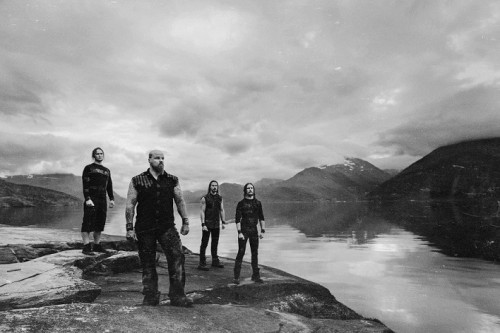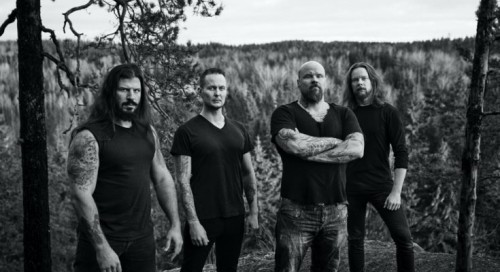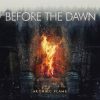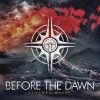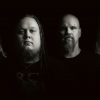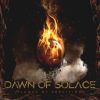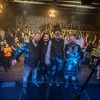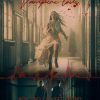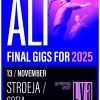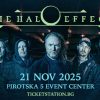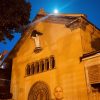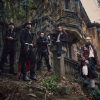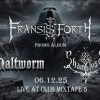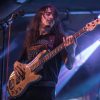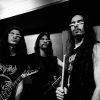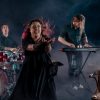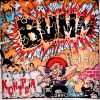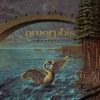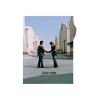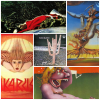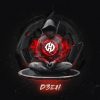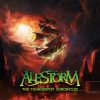За творческия порив – интервю с Tuomas Saukkonen (WOLFHEART, DAWN OF SOLACE)
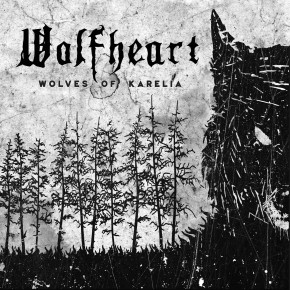 On April 10 WOLFHEART‘s new album – „Wolves of Karelia“ is about to be released. Also, this summer the band will play live at Wolf Fest. That’s why we managed to contact the mind and soul of WOLFHEART (and also an amazing inspiration of mine, since I grew up with BEFORE THE DAWN‘s music) – Tuomas Saukkonen. We spent quite some time to talk about the new release as well as some details about his own creative process.
On April 10 WOLFHEART‘s new album – „Wolves of Karelia“ is about to be released. Also, this summer the band will play live at Wolf Fest. That’s why we managed to contact the mind and soul of WOLFHEART (and also an amazing inspiration of mine, since I grew up with BEFORE THE DAWN‘s music) – Tuomas Saukkonen. We spent quite some time to talk about the new release as well as some details about his own creative process.
Farsot: Few days ago it was announced that WOLFHEART will play on Wolf Fest this summer. As far as we know, this isn’t your first time in Bulgaria – you’ve been here with BEFORE THE DAWN (2009) and WOLFHEART (2016). Do you have any memories of Bulgaria? How do you feel about re-visiting the country?
Tuomas: I don’t remember much of BEFORE THE DAWN‘s visit, I remember when we played with WOLFHEART at Sofia Metal Fest. It was a really nice festival, a really good audience. We usually don’t have that much time to go and see the city, we just have one gig to play. We had just a short walk in the city. But the festival was really nice and I am really looking forward to play for the audience again and I really like the name of the festival now – it’s very „feeling“ for us.
F: Have you prepared something special for Wolf Fest?
T: Well, not yet. The biggest issue at the moment is the whole virus situation and the US tour. That’s the only thing we’ve lately been focused on. I do understand why the tour got cancelled but it’s of course complicated for us – we had the visas and the flights and everything booked and paid. I hope it’s going to be easier in the summer. All our spring shows will probably be cancelled, so what will be special for summer is if we actually get to play. This will be the biggest special thing for us – to be able to play.
F: Supposedly the virus will die in the hot weather.
T: I hope so, yeah.
F: I guess for the summer gigs you’ll be playing more stuff from the new album – the one we’ll hear next month.
T: Yeah, definitely. Probably we’ll put half of the new album on the setlist.
F: That’s great news! I am working on a review of the album, so I already listened to it and WOW! I don’t know how to say it but the music is great! Every time you put something new out there it’s awesome.
T: Thank you.
F: I wanted to ask you how was the preparation for the cancelled US tour going?
T: Well we started rehearsing a while ago and we already included three of the new songs in the setlist. We were supposed to do a video of the tour. Also a lot of the North American promo work was centered around the tour, so that’s going to be quite a mess now. Most of the interviews there, were scheduled to be done during the tour. We did a lot of preparations but there’s nothing you can do in this situation. It’s the same rules for everyone. A lot of tours will be cancelled, so I don’t complain. It’s not just us – this is affecting a lot of bands, a lot of venues, agencies, promoters – it’s a big thing. But gigs can always happen later, people need to stay healthy.
F: What changed for you personally between „Constellation of the Black Light“ and „Wolves of Karelia“?
T: There were a few changes. Now the theme is different. I usually don’t like doing themed albums. But now all the lyrics are based on stories told and written by veterans of the Winter War between FInland and Russia and WWII. So the whole album is focused on 3,5 months between 1939 and 1940. So the theme now is a lot more solid than before and the writing process was completely different. I usually write music constantly, so there’s always some new song in the process. But after „Constellation of the Black Light“ we played about 140 shows in 10 months, so there was no time or opportunity for me to write any music for that period. I was constantly on tour or flying somewhere, or flying back and then having short time at home and then going again. I don’t think I’ve ever been that long off writing music as I was then, so when the tour cycle was over last August, I already had a lot of ideas in my head and it was like opening a flood gate when I got to the studio. I had a lot more ideas than before because I had to store everything in my head and probably that was the reason why there was also a new DAWN OF SOLACE album. There were so many ideas and so much I wanted to do and write that I couldn’t do for such a long time. So that was the difference.
F: Since you mentioned the story… In the last album there was a story between the videos. Are we expecting something similar or are you going in a completely different direction with the video material?
T: There is actually a small connection between the videos. I am in the middle of editing the first one. The videos don’t continue directly but they have a similar main idea. The goal of the previous album was to make 3 videos but we never had the time, opportunity or money to make the third one. There was supposed to be a third one – to complete the story but that just didn’t happen. It’s not easy to find the budget for that many music videos nowadays. But there’s a connection, I can’t say what it is because that wil be spoiling the whole thing. If you watched the „Breakwater“ video carefully at some point of the video of „Hail of Steel“ you’ll get the connection.
F: Do you think there will be a chance in the future to create the third video from the previous album, just to finish the story?
T: In theory – yes, but it really it won’t make sense to put that much effort promotion-wise for an old album. We actually have the storyline for the third video already shot, but we weren’t supposed to have that much touring. We didn’t have enough time in Finland to arrange the shootings and we were also in between changing guitar players. Mika (Lammassaari) was unable to continue with us and we had only a session guitarist to replace him. So it was a complicated time because we didn’t know who was going to play the guitar. It was easier to let the video go. And now, since I have a new album coming out, I’d rather do all the videos for it. Maybe I’ll learn for the future albums not to make too big of a plan. I really don’t think this third video is going to happen because the song and the album are old and now we need the promotion for the new release.
F: Yeah, it’s only logical. Have you received any reviews for „Wolves of Karelia“ since the promo is sent to differet medias, ours included? Do you have any response or this usually happens after the official release date?
T: I haven’t seen any yet. I haven’t checked if there’s anything online. Usually they pop-up a lot closer to the release – about two weeks before it we receive the first ones. I’ve been only talking to reportes, so far everybody seem to like the album. But it’s just our luck, at least with bigger magazines, the albums end up with a person who really doesn’t like them for some reason. You never know. It’s just one person’s opinion that is a big part of the whole promotion plan. But we’ll see, I haven’t read a single one so far.
F: Okay, then when I’m finished with mine, I’ll send it to you.
T: Thank you, that will probably be the first one.
F: Are you excited to play the new material when the tours kick in? Is it a different feeling than playing in the studio? Well, fans know you and a big mass of people like your work, so how does it feel to go on stage and play something that you haven’t played in front of anyone yet?
T: Well, usually everyone in the band is nervous. New songs are always new. There’s not the same routine. We still keep the song „The Hunt“ on the setlist. It was our first single ever. And we’ve played it about 600 times now and we know it pretty well. I’d be amazed if we get it wrong some day because we’ve repeated it so much. But with new songs it’s different. You’re a little bit nervous ’cause you never played it for the audience, you don’t have the same routine. Also with every album we go faster with the guitars and that creates a different kind of challenge for us as musucians. So the new songs are usually the hardest to play. You’re happy when you’re done with the song than before when you started it and there’s also excitement. Fresh songs are always fun to play and it gets more fun after the first five gigs.
F: Speaking of concerts, how do you chose what to include in the setlist, what to play live?
T: That depends on the tour. In festivals we can play about 70 minutes, in some tours – about 40 minutes. But we try to include material from all albums if possible. And of course the main point is always to accent on the last album. It was a lot trickier with the US tour that just got cancelled. There were just 40 minutes for us to play and we wanted to include 3 songs from the new album which left only 4 songs from the previous releases. It gets a little hard when you have to choose only one song per album and of course we need to put priority for the best known songs. Usually those are the songs you find in YouTube, the ones with the videos. Despite these complicated times, our agency is booking a headline tour for us in Europe. It should be in September-October. Hopefully we’ll be able to play at least 75 minutes, so it will be a lot easier to make the setlist. We’re going to do a lot of gigs in Eastern Europe which is really good, because often those certain areas are not included in the European tours.
F: Yeah, we usually get left behind.
T: We’ll have about 40 gigs, but yeah, we’ll be in your neighbourhood. If the situation gets better, of course. Having to cancel more than one tour is going to have an effect on the band. It’s not easy to promote an album if you don’t get to tour, so that will affect us on many levels. But the tour starts in the middle of September, so there’s a lot of time for the European countries to fix the situation.
F: I really hope the tour happens because for the past two years here we saw bands like Insomnium and Omnium Gatherum and the turnout was magnificent. I really didn’t expect that much people, but it was nice to see different generations interested in the genre of melodic death metal. I just think a concert by WOLFHEART in Bulgaria will be awesome and people will be really happy to see you.
T: I will be happy too.
F: Speaking of tours, as a vocalist I want to ask you how do you keep your voice?
T: It varies quite much depending on the technique that you’re using. I think mine is quite easy, because it comes from a little bit deeper and it doesn’t tire my throat that much. I do need a certain amount of sleep, I do need to remember to eat a good amount of carbs and drink enough. I think that applies to all vocalist, because otherwise your throat gets too dry. And if you drink a lot of alcohol on tour, this makes you drier and it can damage your throat. And you can’t recover in 1 or 2 nights. Monitoring is quite a big issue also. It’s usually my biggest challenge – to get the right balance with the vocals and the rest of the stuff. But I think the technique is the most important thing you find, so you are able to do it night after night. And the warm-up. I was actually talking about this one with the vocalist of OMNIUM GATHERUM (Jukka Pelkonen) and he has a really good technique for the warming-up, even though it sounds stupid to warm-up for extreme vocals, but it’s more abour working on the small muscles in the throat. Still the overall technique is important because I know guys who can do only 3 gigs in a roll and then they’re a damaged. And then there are guys like Mikko from SWALLOW THE SUN – he almost talks louder than he growls. So his growling is at his speaking level and it’s a lot easier on the throat because you don’t need to push a big amount of volume. Then again, explaining different growling techniques is difficult because everyone has their way of doing it anyway. You just need to remember to eat properly and drink enough water. Because a lot of musicians in general get too easily in „party mode“. I don’t drink on tours at all but I understand the point – away from home, away from work, usually having fun… It doesn’t matter if you’re a guitarist or a drummer with a hungover, but a vocalist’s „instrument“ is delicate. If the guitar sound a little bit bad, it’s going to be ok for the audience, if the drummer makes minor mistakes, probably no one will notice, but the vocalist is in the front and that’s what people usually pick at first. There are no excuses. If the vocals are weak, it makes the whole the band sound weak. It’s cruel. People don’t usually analyze or understand. They don’t think if you’re tired or have trouble with the monitors.
F: In a previous interview you said that all band members live in different cities and basically you gather for rehearsals just before the tour. So, are you still doing this? Because all your performances are perfect for a live gig – coordination, sound, etc. How do you do this when you’re rehearsing just before a tour, not all the time?
T: We still do the same. I don’t think this will change. For the US tour me and my drummer, we scheduled 4 rehearsals, and we already cancelled 1 of those even before we knew the tour will be cancelled. This has two different sides. Since we don’t play much together, it’s a lot more special when we get to play live. I think we are a bit more excited to play our music, a lot more than other bands, because we don’t play our songs together at all. And I’ve been playing for so long with Joonas, the drummer, that we know each other’s playing style and we already play very tightly. We don’t need to play together anymore, we have that. It’s more like remembering the songs and learning the news ones, checking arrangements. Both me and Joonas do our homework. We never go to a rehearsal to learn the songs, we already know them and we mainly focus on other stuff like checking the lentgh of the setlist and doing the merch plan. It’s all different reasons and it’s never just the playing. And I think it works in our favor. I don’t know if you noticed, but usually bands perform better when they have more fun, there’s different kind of energy. The more excited you are in everything you do, you put a little bit more of yourself in it. And you want to do it better because you’re excited by what you’re doing. So I think this is one of the factors that actually allows you to play good gigs that easily. We also usually rehearse only me and Jonas, only one guitar, vocals and drums – no bass, no second guitar. So everything sounds better when we are on stage. We learned to play like this a long time ago and it allows us to be more excited and to expect the shows. And this in turn makes us to push a little further in doing our homework and rehearsing on our own. We don’t want to go up there and get things wrong because events are or us too. Also I am a bit of an old-school musician, not very fond of this digital age when you don’t even need to learn to play your instrument but just edit and copy-paste everything in the studio. The key is just to be prepared, to know the songs and to learn your instrument as well as needed and then just learn to play with your bandmates.
F: What do you prefer – writing music or touring and playing music life? I know both go hand in hand but which one would you choose?
T: Hm, I think writing music and being in a studio is a lot more comfortable for me. There are no variables – I decide the schedules, I have a lot more control over the outcome. When you’re on tour everything is different every night. But I hope there is never a situation to choose just one – just working in the studio and just writing music is too much of the same. I will need to be able to play. But for me to be able to enjoy the show comes from having a good enough monitor, not perfect, but I really get frustrated if it’s not working fine. It may sound as a cliché but everything I do when it come to writing music and playing, first of all I do it for myself. So if I don’t get to enjoy it, I don’t really see the point.
F: Yes, this should be a mantra for anything in life – if you’re not enjoying something, then just better not do it.
T: You’re wasting your time and eventually you will die anyway. At least what I know about life after death – there is none, so you shouldn’t waste your time doing stuff you don’t enjoy. I enjoy doing music and I can’t really use that philosophy when I am touring, because that will mean I will walk off stage every time I don’t like the monitors and that’s not a good idea. In general everyone should focus more energy on what they like in their life instead of what they think other people expect them to do.
F: You’ve mentioned before, regarding WOLFHEART that you write most of the music in winter. Has that changed?
T: It almost changed. I do not work as a gardener anymore because theres no time. But last summer we were touring so I was unable to write music, even though I wasn’t working. I’ve been writing songs in winter because I was working in summer, and my winter holidays were from October to March – 5 months per year. It was easy to divide the time – in summer I work and make money and in winter I focus only on music. In theory it changed but not in reality because of the tour.
F: You’re writing music all the time, but are there some times that you feel drained, out of ideas? Do you experience the creative block?
T: I do write new material quite often, this weekend I have scheduled demo recordings for a completely new projects. And that’s what I enjoy a lot – being able to write new stuff. But it doesn’t mean I HAVE to write new stuff. There are days when I pick up the guitar for some basic training, nothing good comes out and I just put the guitar away. I never consider the „creative block“ because in my opinion this means i am struggling to get the new material out. Next day probably there will be something new again or the next day. And the next day always arrived so far. I never really had any kind of frustration with new music that I wasn’t able to get out. I could, in theory, write a lot more than i do now, but it wouldn’t make any sense to release that many albums. It will only do so much damage for the promotion.
F: I want to ask about your new guitarist – Vagelis Karzis. How did you connect with him and how did he add up to the new material?
T: He’s a new member so we’re still learning to work together. The first time I met him was at a German festival. He came to ask us for a battery for ROTTING CHIST‘s drum module or something. Then I was watching their gig, I value his band’s music but I am not a huge fan – I usually don’t go and see many concerts anyway. But I thought I should go and see a few songs before going to the airport. Then I saw Vagelis and I was like „What the f*ck!“. He was a total badass on stage. And when we arrived at home I messaged him through Facebook that we’ll probably need a session bass player for the US tour at that time, asked if he’d be interested. And then we continued the conversation for possible collaboration in future. Then I learned he’s actually a guitar player. At that time we started having schedule problems with our own guitar player – because of his school and work he was unable to join us at tours and later it became impossible for him to do touring at all. Sometimes, you know, the world is super small. We got a new sound guy, he’s also greek. We met him on our tour with CARACH ANGREN, got along pretty well and asked him to work with us too. Then I learned he’s best friend with Vagelis, and they have a band in Athens. That naturally brough up the whole topic again and we asked Vagelis to be a session guitarist for the last summer tour. We got along pretty well. It went super smooth. He’s a very, very good human being, it’s easy to be around him. For this album I’ve written everything and Vagelis recorded 3 solos and some backing vocals.
F: Okay, final question. If you have to describe WOLFHEART with just one word, what would it be?
T: Just one? Hm, that’s difficult. Ah, okay, I have the perfect word. It’s a Finnish one. It doesn’t translate completely into other languages. It’s about that basic Finnish perseverence, that is also a topic in the new album and the power of the will, but it has a lot deeper meaning in my language. It’s historically connected to the times of the Winter War. That’s the word „sisu“. It’s the perfect word to describe WOLFHEART and it will be an honor if other people recognise the connection.
F: Well, thank you for your time, also thank you fo your music. It was really an honour to speak to you. I hope to see you soon.
T: Yeah, thank you for the interview, it was really cool. And see you soon.
